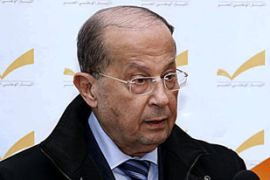Aoun offers Lebanon presidency deal
Opposition leader withdraws his candidacy after a day of French-led diplomacy.

He said that Saad al-Hariri, the parliamentary majority leader, would then name a prime minister from outside his Future Movement to form a national “reconciliation government”.
The deal would also give the Hezbollah-led opposition 45 per cent of the seats in a new national unity cabinet.
Christian vote
Aoun has previously refused to consider any other person for the presidency, pointing out that he is the only figure to have received more than 70 per cent of the Christian vote in past elections.
Al Jazeera’s Zeina Khodr in Beirut said that the leaders of the ruling March 14 group were meeting late on Thursday to discuss the proposed initiative.
She also said that Hezbollah, the Shia Muslim movement that is Aoun’s partner in the opposition, was expected to support the deal.
“They are allies, they signed a co-operation agreement earlier this year, they are stauch supporters,” she said.
“It is highly unlikely Michel Aoun would come up with this initiative without discussing it with his allies.”
Session ‘postponed’
Aoun’s announcement came after a member of the ruling bloc told the AFP news agency that a parliamentary session would not take place.
“Friday’s session has been postponed,” Solange Gemayel said. She said the postponement of the session would be officially announced by Nabih Berri, parliament’s speaker.
Four previous parliamentary sessions at which a new president should have been named have been postponed over the past two months.
According to the Lebanese constitution, if no candidate is chosen by parliament to replace Lahoud, the outgoing head of state hands over power to the government, which can then pursue talks on a compromise candidate.
‘Catastrophes’
Lahoud has said he will take action before leaving office if no deal is reached on a successor, but he has not said what he plans to do.
“I stand by my position that this government is illegitimate and unconstitutional. If it thinks it can go on without the election because of outside backing, it will bring catastrophes on the country sooner or later,” Lahoud’s office quoted him as telling a Hezbollah-led delegation.
“Therefore, even if I stand alone, there are duties I must perform. My conscience is clear and I hope it will be good for Lebanon,” he said.
The president must be a Maronite Christian according to Lebanon’s system which divides power between the various sectarian groups.
